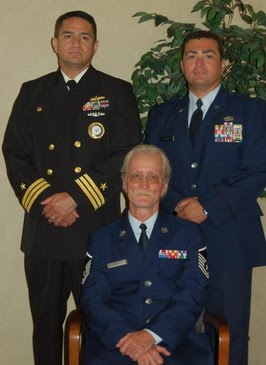I didn't watch the President's speech in real-time today, but I read the full text. I also haven't read the blogosphere's reaction to the speech, but I will, in good time. I did read the Associated Press' wire report on the speech, more on that blurb in a moment. But first...
I don't believe the President said much, if anything, new in today's speech. There was this little item, however:
One of the blessings of our free society is that we can debate these issues openly, even in a time of war. Most of the debate has been a credit to our democracy, but some have launched irresponsible charges. They say that we act because of oil, that we act in Iraq because of Israel, or because we misled the American people. Some of the most irresponsible comments about manipulating intelligence have come from politicians who saw the same intelligence we saw, and then voted to authorize the use of force against Saddam Hussein. These charges are pure politics. They hurt the morale of our troops. Whatever our differences in Washington, our men and women in uniform deserve to know that once our politicians vote to send them into harm's way, our support will be with them in good days and bad, and we will settle for nothing less than complete victory. (emphases mine)Those remarks are aimed primarily at Mssrs. Dean, Reid, Kerry, Murtha, and Madame Pelosi; and to a lesser extent the bomb-throwers on the Left, primarily the MoveOn, kossack, DU, and Code Pink crowds. All of the intended recipients of the President's remarks are completely tone-deaf; I don't expect anything other than more nay-saying political point scoring exercises in response. Case in point; the AP, in its wire report on today's speech, quotes Senator Kennedy (D-Chappaquidick):
"There was no reason for America to go to war when we did, the way we did, and for the false reasons we were given," said Sen. Edward Kennedy (news, bio, voting record), D-Mass.::sigh:: I suppose I'll find similar, if not worse, comments from the Democrats' leaders once I go looking.
Now, about that AP wire report. Factual? Yes. I cannot argue that; there are no glaring errors or misinterpretations. Tone? Awful. Borderline disrespectful. Al-Jazeera could have done no worse.
Why do I think this? To begin, let's just take the way the writer addresses, or names, the President of the United States. She uses the term "Bush" 13 times in her article and the lower case title "president" seven times. "The President?" Once, in the lead sentence. "Mr. Bush?" Zero, as in: nil, naught, none. Just "Bush." My copy of the AP style manual is 20 years old, so I'm not going to dig it out. But I know we used to use, at the very minimum, the title "Mr," "Mrs," or "Miss" (now "Ms" to be PC) when referring to public figures. Ms. Loven is being, at the very least, disrespectful to the office of the president of the United States, if not the man himself.
Tone is important, tone sets the perception about an individual's, or an organization's credibility. Disrespect, even minor disrespect, as is evident in Ms. Loven's writing, does not enhance her credibility.
There's this:
"The president's mea culpa was accompanied by a robust defense of the divisive war.""Mea culpa?" Is the man in the dock? Why not "acceptance of responsibility?" Why not "statement accepting responsibility?" "You're guilty, Bush, and it's time you gave us that mea culpa!" And "divisive war?" Isn't just plain old "war" good enough? Or if one wants differentiate between Iraq, Afghanistan, and the general war against radical Islam, one could simply say "Iraq war." But, no! We must be reminded the war is "divisive."
One more thing, and then I'll stop. Deconstructing the AP isn't all that rewarding, but it is kinda fun.
"(Mr. Bush's speeches)...included descriptions of fixes for early mistakes and sober assessments of remaining challenges.Oh, that's rich. Ms. Loven apparently has no sense of irony. Who confronts the majority of Americans "with daily doses of bad news and rising death counts in Iraq?" Might it be you and your peers at the AP, the NYT, the LAT, the BBC, and Al-Jazeera, Ms. Loven? When you're feeding the people their daily dose of gore and mayhem, do you expect them to be optimistic? Of course you don't. That's not your intent, after all. Let's look at your track record for one day this year (link, but hurry, publicly available WSJ articles expire in about a week):
That reflects the majority of Americans who, confronted with daily doses of bad news and rising death counts in Iraq, disapprove of Bush's policies there and question the outlook for victory. For instance, a new poll by the Pew Research Center for the People & the Press found that most people see progress in areas such as establishing democracy and training Iraqi security forces but are split on whether the United States is defeating the insurgents.
No slant there, eh?About a year ago, concerned that he might have been exaggerating when he made this assertion on the basis of his "gut feeling," Mr. Chrenkoff decided to check it out more scientifically. So he did "a little tally" of the stories published or broadcast all over the world on a single average day (which happened to be Jan. 21, 2005). Here are some of the numbers that, with the help of the Google News Index, he was able to report from that one day:
2,642 stories about Condoleezza Rice's confirmation hearings, in the context of grilling she has received over the administration's Iraq policy.
1,992 stories about suicide bombings and other terrorist attacks.
887 stories about prisoner abuse by British soldiers.
216 stories about hostages currently being held in Iraq.
761 stories reporting on activities and public statements of insurgents.
357 stories about the antiwar movement and the dropping public support for involvement in Iraq.
182 stories about American servicemen killed and wounded in operations.
217 stories about concerns for fairness and validity of Iraqi election (low security, low turnout, etc.).
107 stories about civilian deaths in Iraq.
123 stories noting Vice President Cheney's admission that he had underestimated the task of reconstruction.
118 stories about complicated and strained relations between the U.S. and Europe.
121 stories discussing the possibility of an American pullout.
27 stories about sabotage of Iraqi oil infrastructure.
As against all this, the good news made a pathetic showing:
16 stories about security successes in the fight against insurgents.
7 stories about positive developments relating to elections.
73 stories about the return to Iraq of stolen antiquities.
Obviously, then, the reporters and their editors in the mainstream media have been working overtime to show how badly things have been going for us in Iraq.
In an interview with the President today, Fox News' Brit Hume asked Mr. Bush what his greatest fear was. I'm paraphrasing here, but the President responded to the effect that his greatest fear was "the American people will lose their will in this fight." When the majority of Americans get their "daily doses of bad news and rising death counts in Iraq" from the AP and their ilk, Mr. Bush is right on target. One should be very afraid.




.jpg)




No comments:
Post a Comment
Just be polite... that's all I ask.